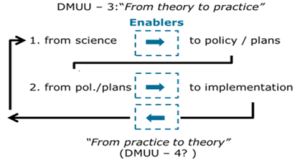by Marjolijn Haasnoot (Deltares, Delft University), Judy Lawrence (New Zealand Climate Change Research Institute), Robert Lempert (RAND), Nidhi Kalra (RAND), Jan Kwakkel (Delft University)
In early November 2015 about 100 scientists and practitioners from all over the world shared their experiences and methods at the third annual meeting of the Society for Decision Making Under Deep Uncertainty in Delft, Netherlands. The workshop was hosted by Deltares, Delft University of Technology, and UNESCO-IHE and co-organized with RAND, the World Bank, Victoria University of Wellington’s Climate Change Research Institute, and staff of the Dutch Delta Programme.
Deltares scientific director Jaap Kwadijk kicked-off the meeting with an observed change in the conferences’ content since its first meeting held at the World Bank in 2013. The most frequent words in the abstract titles changed from ‘(robust) decision making, planning, and analysis’ in the first meeting to ‘(climate) change, adaptation, and uncertainty’ in the second meeting, to ‘deep uncertainty and adaptive’ at this year’s meeting.
The theme of the conference ‘From Theory to Practice’ was the main thread. Robert Lempert (RAND), Patrick Reed (Cornell University) and Marjolijn Haasnoot (Deltares/Delft University) presented their latest insights on three important methods for dealing with deep uncertainty: robust decision making, multi-objective robust optimization, and dynamic adaptive policy pathways, respectively. Both quantitative model-based approaches such as exploratory modelling and qualitative approaches, such as descriptive scenarios and storylines by Freija Duijne and Angela Wilkinson (OECD), were addressed. In break-out sessions various policy domains were addressed including defense, transport, delta and river basin management, water supply, and energy. Economic evaluation and assessment methods that can deal with uncertainty and changing risk featured. Decisive moments, macroeconomic applications, system models, actor-based matrices, scenario discovery, strategic planning, decision trees and adaptive planning approaches all featured in the discussions. The role and challenges of monitoring in conditions of uncertainty were also highlighted. Examples of these approaches were shared across the various domains in which they had been applied. Particular challenges in developing countries featured. In a panel chaired by Nidhi Kalra (RAND) practitioners and scientists from Indonesia, Bangladesh, Benin, Vietnam, and World Bank discussed their experiences. The scarcity of resources (people, data and models) was one of the issues raised to apply the deep uncertainty approaches in practices. Also, despite the complexity of the problems, the importance of keeping solutions simple and communicable was highlighted.
Experiences from practice were presented from the Thames 2100 study in the UK and the Delta Programme by Pieter Bloemen (Staff Delta Programme) and Tim Reeder (Environment Agency), on the on-going shift toward adaptive planning in New Zealand by Judy Lawrence (Victoria University of Wellington), and on teaching deep uncertainty methods by Steven Popper (RAND). Together participants discussed the barriers and enablers to go from theory to practice Barriers to uptake of new approaches fell into several categories; political resistance, short-termism and institutional inertia; values and preferences of stakeholders not understood; few insights on implementation barriers; lack of communication and experimentation with new approaches; governance and implementation capacity. Enablers key to implementation included framing the nature of the uncertainty problem and its clear communication; being aware of cost shifting and cascade of consequences; the role for champions to leverage new capacities; institutionalisation of regular policy evaluation; work with and develop relationships with different stakeholders; use the power of narratives. An important new focus to emerge from the workshop was participants’ call for the results of experimentation and planning studies to inform further theory development, as shown in the figure. Some participants suggested that the next workshop, scheduled for November 2016 in Washington, DC, emphasize the theme of “from practice to theory.”
At the end of the meeting participants endorsed launching a new Society for Decision Making Under Deep Uncertainty. Elections were held in December and officers chosen for a one year term. You can learn more about, and join our society, at: http://dmdumembershiptest.hospedagemdesites.ws/migration
Nidhi Kalra summarized well this third workshop of what is now our new society: ‘There is a buzz in the air about a common vision that the world can be a better place and that we can play a role to play in making a better place. The way our leaders and decision makers make decisions does not consider the full complexity of the challenges the world puts at us. There is opportunity for improving the world in which we live in if those decisions take a different lens; from a lens of prediction and certainty and comfort to one of uncertainty and discomfort. If we can equip ourselves and decision makers with a way to confront the unknown, then we can start on a path towards making better long-term decision and seeing better outcomes and state of the world we live in.‘ This is a role we – as a society – can take.








